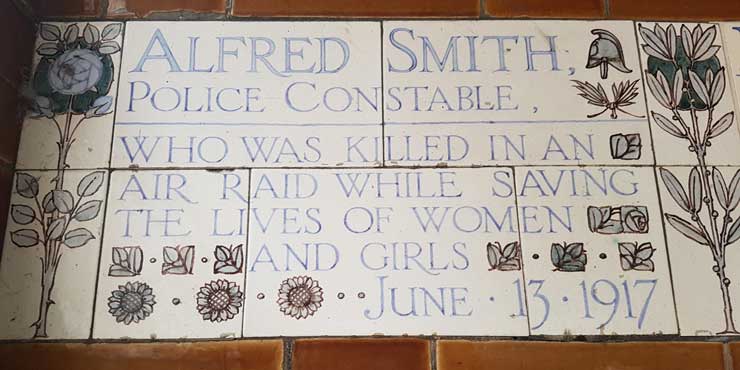
Alfred Smith (1880 -1917) had joined the Metropolitan Police in 1902 and, by June 1917, he was serving with the force's G Division, when, on Wednesday 13th June 1917, he went to the assistance of a group of women during a First World War air raid on London.
His plaque in Postman's Park, reads, "Alfred Smith, Police Constable, Who Was Killed In An Air Raid While Saving The Lives Of Women And Girls. June 13 1917."
Although Police Constable Smith demonstrated genuine bravery, the curiosity of his death is that it appears to have come about as a result of the curiosity of the women and girls whose lives he, undoubtedly, saved.
Around mid-morning on Wednesday June 13th 1917, PC Smith was on point duty close to a factory in Central Street, Hoxton, to the East of the City of London, when, high over London, fourteen German Gotha planes began unleashing their deadly cargoes of bombs onto the streets below.
A mixture of panic and curiosity appears to have gripped the citizens of the Metropolis as the bombs began to explode around them.
According to a report in The Newcastle Journal on Thursday June 14th 1917:-
"A report from the central zone of the enemy's activities states that business was in full swing when the raiders made their appearance, and although the streets were crowded, there was little, if any, sign of panic, the people behaving with remarkable composure.
The enemy aeroplanes were flying at a high altitude at first, invisible to the naked eye, and not until the firing of the guns overhead were the public made aware of their presence."
Under the above headline, the Pall Mall Gazette, in its issue of Friday 15th June 1917, carried the following report on the fate of PC Smith and of the proceedings at the subsequent inquest into his death:-
"Dr. Waldo, the City Coroner, inquired into forty-seven deaths.
Some of the bodies had been mutilated beyond recognition, and in many cases it was only by marks on handkerchiefs or other articles of clothing that relatives were able to identify hesitatingly their loved ones.
In the case of PC Alfred Smith, aged thirty-seven, a member of the Metropolitan Force, who leaves a widow and three children, the widow said that her husband had been up all night with pains in his leg.
He was not fit to go on duty, but he would do so.
The Coroner: Why? - Because he wanted to do his duty.
A police-sergeant said that deceased was on point duty at the spot.
When the bombs began to fall the girls from the warehouse ran down into the street.
The Coroner: To have a look? - Yes, excitement and curiosity.
Smith had got them back and had stood in the porch to prevent them returning.
The Coroner: You have instructions to do that? - Yes.
The Coroner: So that in doing his duty he sacrificed his own life? - Undoubtedly.
One of the girls working at the warehouse said that they heard explosions, and, crying, "Bombs!", they ran downstairs.
The Coroner: Why? - It was natural, wasn't it?
The Coroner: I don't know. I should have thought you would have gone to a place of safety.
Witness: I was going into the street and Police-constable Smith put out his arm and held me back and an explosion took place.
None of you was injured? - No.
Medical evidence showed that the constable had no wound sufficient to cause death, which was due to shock."
The Western Daily Press carried the following report on the police officers death on Saturday 16th June 1917:-
"In the case of PC Allred Smith, a popular member of the Metropolitan Force, who leaves a widow and three children, the deceased was on point duty near a warehouse.
When the bombs began to fall the girls from the warehouse ran down into the street.
Smith got them back, and stood in the porch to prevent them returning.
In doing his duty he thus sacrificed his own life."